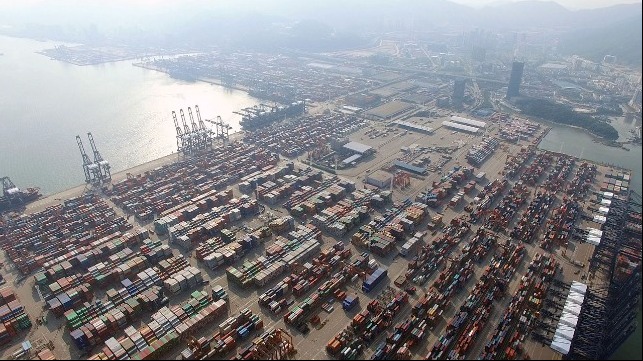Congestion Grows in China’s Yantian Port due to COVID-19 Outbreak

The container shipping industry and global supply chain from China are facing a fresh challenge due to a disruption at Yantian and the neighboring Shekou ports in southern China near Hong Kong. The province is facing increased restrictions, which are impacting port operations at one of China’s busiest export terminals, due to newly reported cases on COVID-19.
The increased measures began in late May after cases of the COVID-19 virus were diagnosed among workers within the port. Chinese and port officials implemented stringent restrictions and disinfection routines and this week it appeared that the situation might be improving. Port officials said export would resume from the terminals, although with continuing restrictions.
All the major container shipping companies in recent days have warned customers of disruptions to the flow of containers through the port. Estimates are that there are more than 20,000 TEU now backlogged in the port, with some sources saying as many as 50 or 60 ships are now anchored out. It is sparking scenes of the congestion that built up in southern California in January and February and which the ports of Los Angeles and Long Beach are just now catching up.
Today, Maersk provided a new update to customers. The statement said in part, “The situation continues to deteriorate as more positive COVID cases have been confirmed in Shenzhen where Yantian port and Shekou port are located. We continue to closely monitor the situation and are doing our best to mitigate the impact on your supply chain where possible.”
The primary bottleneck appears to be emerging at the Yantian International Container Terminal, which handles approximately 13 million TEU annually. The Shenzhen region is among the top five container ports in the world, handling as many as 25 million TEU annually.
While imports are continuing at the port, exports are being hampered by the restrictions. Maersk warned customers that the eastern portion of the port, which handles the largest containerships, is open but operating at approximately 30 percent of normal capacity. They reported the western terminal remains closed entirely. To manage traffic and volumes in the port, officials are also limiting the number of days containers can arrive before their scheduled departure.
“We expect continued terminal congestion and vessel delays upwards of 14 days in the coming week,” Maersk warned customers in its June 3 update. On May 31, Maersk told shippers it anticipated delays of 7 to 8 days this week.
Faced with the prospects of continuing backlogs and delays, all the major shipping companies have begun to warn customers to expect delays which if not controlled could reverberate further across the supply chain. All major carriers and their alliances are starting to increase the number of vessels that are omitting calls to the Yantian International Container Terminal due to congestion and uncertainties. Maersk is also reporting blank sailing now for Shekou although in some cases they are permitting customers to divert traffic to the neighboring port to avoid the delays at Yantian.
MSC yesterday wrote to customers saying it will also be omitting a number of calls at the Yantian port to minimize the impact on its vessel schedules. ONE has announced 12 blanked calls so far as part of The Alliance, while an increasing number of carriers are recommending that shippers divert the traffic to other Chinese ports.
Chinese officials are seeking to reassure the shipping industry, saying they are stepping up testing in the region. They are saying that most of the cases are not in Yantian but instead in the surrounding areas, and they hope to use quarantine programs to isolate the outbreaks. However, the ongoing restrictions and backlogs are likely to have an increasing impact on container volumes on both the European and U.S. routes as Yantian is an export hub for China.

that matters most
Get the latest maritime news delivered to your inbox daily.
photo by Gigel ata licensed under CCBY-SA4
